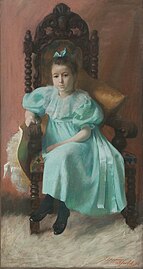Joseph Henry Hatfield
Joseph Henry Hatfield | |
|---|---|
 Hatfield in his studio, c.1895 | |
| Born | June, 1863 |
| Died | January 12, 1928 (aged 64) |
| Style | Impressionism |
Joseph Henry Hatfield (June 1863 – January 12, 1928) was an American painter and manufacturer of artist's oil paints. His work was shown in national and international exhibitions.
Biography[edit]
Hatfield was born near Kingston, Canada West, to William and Mary Jane (née Blick) Hatfield. Both parents and an older brother were born in England. William Hatfield was a silk weaver.[1] In 1862 the family emigrated from England to Canada, then moved to Boston in 1866.[2]
Hatfield became interested in art at an early age. The 1880 U.S. census listed the sixteen-year-old's occupation as "artist". In 1889–1890 he studied in Paris at the Académie Julien with Jean-Joseph Benjamin-Constant, Henri Lucien Doucet, and Jules Joseph Lefebvre. He participated in the Paris Salon in 1891.[3]
Hatfield settled in Canton, Massachusetts, and also maintained a Boston studio in the Harcourt Studios building, which burned down in 1904.[4] Trained in figure painting, Hatfield specialized in genre painting, particularly scenes of children at play. Later in his career, he concentrated on landscapes.
Hatfield also supplied illustrations for periodicals. His drawings for The Yellow Wall-paper, a short story by Charlotte Perkins Stetson, were published by The New England Magazine in January 1892.
Noticing that many artists' oil paints in general use darkened over time, Hatfield decided to make his own. Starting in his basement with pigments imported from Europe, he developed a line of paints he called Hatfield's Hand Ground Artists Oil Paints. When the business outgrew the basement, Hatfield built a small factory behind his house in Canton Junction.[5] In 1898 he opened a retail store, Hatfield's Color Shop, in the basement of the Hotel Ludlow in Copley Square. Hatfield sold his paints along with other artists' materials, and hosted exhibitions of the works of other artists.[6] After his death in 1928, the shop was run by his elder daughter, Doris. The business had branches in the Massachusetts towns of Cambridge, Rockport, and East Gloucester.
In 1885 Hatfield married Flora E. Barber in Vermont. They had two daughters, Doris (1888–1977)[7] and Pauline (1899–1950), who often served as models for their father. The 1900 U. S. census lists Hatfield as a naturalized citizen.[2]

Exhibitions and awards[edit]
- Boston Art Club, 1888–1902
An exhibition in 1894 included one hundred and forty works by Hatfield.[8] - Paris Salon, 1891, Letter from Papa[8]
- Massachusetts Charitable Mechanic Association, 1892, Letter from Papa and The Doll's Bath[9]
- Massachusetts Charitable Mechanic Association, 1893, silver medal[10]
- World's Columbian Exposition, Chicago, 1893, Letter from Papa, The Doll's Bath[8]
- Art Institute of Chicago, 1894
Helping Papa, perhaps Hatfield's best-known work, depicts his daughter adding a stick figure to a landscape painting. - Pennsylvania Academy of Fine Arts, 1896, Among the Flowers[11]
- Second Hallgarten prize ($200), National Academy of Design, 1896, After the Bath
- Louisiana Purchase Exposition, St. Louis, 1904
Gallery[edit]
References[edit]
- ^ "William Hatfield", United States census, 1870; Boston, Suffolk, Massachusetts; page 14, line 32, enumeration district 15.
- ^ a b "Joseph H. Hatfield", United States census, 1900; Canton, Norfolk, Massachusetts; page 4B, line 76.
- ^ Baschet 1891, p. 155
- ^ "Forty Studios and Their Contents Destroyed by Fire". Boston Evening Transcript. November 12, 1904. p. 22. Retrieved February 22, 2023.
- ^ "Hatfield's Colors". Canton Historical Society. March 17, 2013. Retrieved March 6, 2023.
- ^ "Japanese Prints at Hatfield's Shop". Boston Evening Transcript. February 24, 1905. p. 10. Retrieved March 6, 2023.
- ^ "Doris Hatfield, ran artists' shop". The Boston Globe. June 8, 1977. p. 24.
- ^ a b c "Exhibition of Mr. Hatfield's Paintings at the Boston Art Club". Boston Evening Transcript. December 12, 1894. p. 12. Retrieved February 20, 2023.
- ^ "The Fine Art Exhibition of Paintings, Water Colors, Statuary and Photographs at the Mechanic Fair". The Boston Globe. October 9, 1892. p. 17.
- ^ "At the Tops of Their Crafts". Boston Evening Transcript. January 12, 1893. p. 5.
- ^ "Boston Artists' Work in the Pennsylvania Academy Exhibition". Boston Evening Transcript. January 6, 1896. p. 6.
Sources[edit]
- Baschet, Ludovic, ed. (1891). Catalogue illustré de Peinture et Sculpture: Salon de 1891. Paris: Librairie d'Art. Retrieved February 20, 2023.








